Six Talking Points for the Six Nations

The Six Nations is arguably the greatest rugby tournament in the world and with just a week to go before it kicks off, it’s time to take a closer look.
Welsh worries
Wales coach Warren Gatland has no Rhys Webb, Dan Biggar, Jonathan Davies, Rhys Priestland, Sam Warburton, Liam Williams, Jake Ball or Dan Lydiate for most, if not all the tournament. George North, Hallam Amos, Taulupe Faletau and Gloucester flanker Ross Moriarty have only just returned from long-term injuries. In a team that has spent the last couple of seasons spluttering while struggling to adapt to a new style of play, this year’s Six Nations could be quite a painful watch for Welsh fans. The Principality Stadium will always be an incredibly difficult place to visit and win a Test match, and Wales will be thankful they have three home games, but their injury list is colossal. It’s difficult to see them picking up anything in Dublin or at Twickenham, but they should have enough to beat the French and Italians at home. The key match is the first one, home to Scotland, where a new power shift could materialise, with the two teams seemingly going in very different directions.
Ireland the team to beat?
Meanwhile, across the Irish Sea, things are falling into place very nicely indeed ahead of next year’s World Cup. Central contracts have allowed the Irish to manage key players’ game time with their regions, knowing full well what their international workload looks like, but beyond that Ireland’s squad depth looks mightily impressive. The front row, back row and half-back pairing, in particular, are as good as anything in the world. They have a settled squad, a good balance of experience and youth, and although his game time might be limited, full-back Jordan Larmour is one of the most exiting young talents in Europe at the moment. Joe Schmidt’s men start in Paris, followed by three home games, before they travel to England on the final day. If things to go to plan, it could be a Grand Slam decider at Twickenham on St Patrick’s Day.
Same old Italy?
Conor O’Shea’s appointment in March 2016 was a shrewd one, but if anyone was under any illusions of the size of the Irishman’s task, the 2017 tournament demonstrated just how much of a gap there is to make up. As per, their talisman will be captain Sergio Parisse, and while he will do all that he can (which is more than most, to be fair), scoring tries is the real concern for the Italians. O’Shea’s remit is to grow the club and international game long term – there are no quick fixes to be had. He has promised that the new faces that he has selected will impress, but with France and Wales both struggling, Italy will need some semblance of improvement against those sides, in particular, now that O’Shea is more than 12 months into the job.
A young France
Trying to call a time when French rugby had more problems than it does at the moment is difficult. The ongoing club versus country squabbling is worse than ever, they’ve recently sacked their coach and their form isn’t far off awful. For some reason head coach Jacques Brunel has decided not to select Louis Picamoles in the squad, despite him being easily France’s best player and one of the best number eights in the world. Six players in the squad have yet to win an international cap, while a further 14 players have 10 or less. Aside from skipper Guilhem Guirado, no one has over 50 (in comparison England and Ireland both have eight players, while Wales have nine, despite their injuries). The cliché goes that you don’t know what to expect with French rugby sides – they’ll either be brilliant or awful – but those days are gone, in 2018 expect the latter.
https://youtu.be/Wf51a8Tb4Dg
Are England underdogs?
Given their financial clout and player pool, it’s difficult to go along with Eddie Jones’s tongue-in-cheek suggestion that the Six Nations holders are not favourites. That said, things don’t seem to be quite as smooth as the Irish camp, for example, and they have nearly 20 players from the squad on the treatment table. Sam Simmonds should prove a capable replacement in the back row, but losing the bulk of Billy Vunipola means Jones may need to find some ball-carrying elsewhere in the field, whether that means moving Courtney Lawes or Maro Itoje to the blindside, or rushing back Ben Te’o into the centre after his lengthy injury lay-off. In addition, he must head into his side’s tournament opener against Italy without Elliot Daly, Jack Nowell, Henry Slade, Kyle Sinckler, Ellis Genge and Nathan Hughes, among others. The aim is, as ever with the English, to win the competition, but this should prove Jones’s toughest Six Nations thus far.
Potential into performance
This tournament should be the year that this exciting and impressive Scottish side convert all their promise into a genuine title challenge. Under Vern Cotter they grew steadily, utilising Glasgow’s free-flowing template for attacking rugby. With Gregor Townsend now in charge that has only been ramped up, with the creativity they now show in attack making them a serious threat. Last year, after much promise, being torn apart by England was a wake-up call to the work still needing to be done and it is unlikely there’ll be a repeat performance this year in Edinburgh. First up this year, Wales in Cardiff. Win there and the wheels for a strong campaign could be well and truly set in motion, while defeat would mean plenty of introspection. Regardless, expect the usual brilliance from Stuart Hogg, player of the tournament for the last two years running.
https://youtu.be/jIYAu4xs64Q













